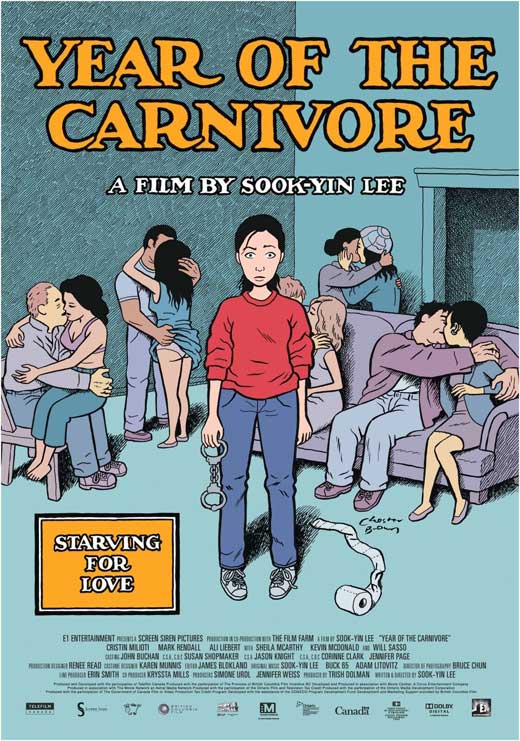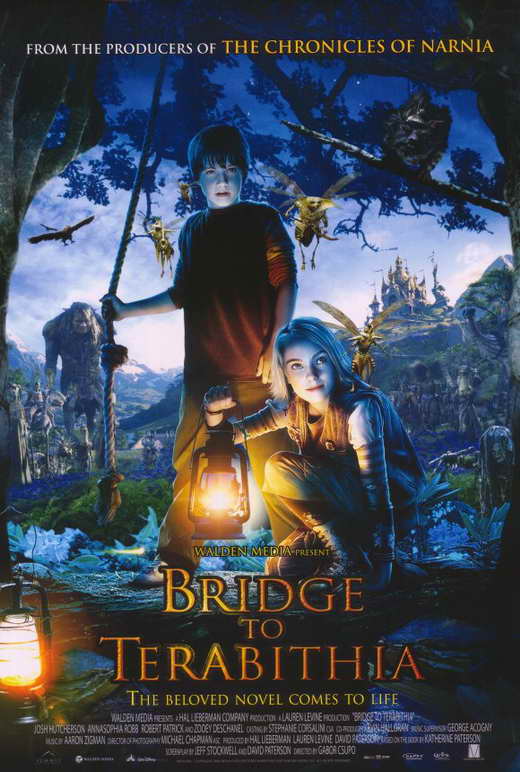Bridge to Terabithia (2007) – I recently read and fell in love with Katherine Paterson’s novel, Bridge to Terabithia, and went into this movie hopeful but skeptical (which, source material or no source material, is the attitude I take to every kid’s movie, honestly), and I was very pleasantly surprised. This movie is a very loyal adaptation of the book’s theme and mood and follows the plot closely. I was so glad, in particular, that the film did not cut out my favorite scene in the book, the conversation between Leslie, Jess, and May Belle concerning the Bible and hell—being a Disney film, I’d wrongly assumed the production team would automatically cut out any discussion of religion. I was also very taken with the aesthetics of this film—painting walls gold to capture the late afternoon sun, keys and old discarded wine glasses hanging from trees, capturing light beams from a stained glass window in a clasp purse for later use—and the keen eye of the wardrobe department. Jess is truly dressed like a poor kid, with frayed edges and dingy colors which are apparent but not exaggerated. I felt a little pang of recognition early in the movie when Jess’s duct-taped tennis shoes are replaced by an image-conscious mother with hand-me-down sneakers even more embarrassing to Jess (as they belonged to an older sister and are, subsequently, the wrong color). And the magical thinkers of the film, Leslie and Ms. Edmunds, dressed colorfully and idiosyncratically, while still staying within the realm of the believable. No vintage Betty Draper dresses here. In fact, Zooey Deschanel was charismatic without falling back on coyness or quirkiness; she is an adult in this film, while still carrying an air of magic. A lot was asked of the child actors in this movie, and I thought the leads delivered, but I was particularly taken with Bailee Madison (May Belle)—her emotional range sort of blew me away. And if we’re speaking of acting, I’d be remiss if I did not mention Robert Patrick (when is he not so good?), perfect in the role of Jess’s stern but sympathetic father. I also loved that every time Jess’s father entered a scene, we could hear his keys jingling in his belt loop. I was less impressed with the CGI, but I understand that to make this a viable children’s movie, that animation was necessary. My only real problem with the film was the off-putting use of modern music (I make this complaint about every movie). I would’ve much preferred a movie score interspersed with the interesting song choices made for Ms. Edmund’s music class, which cleverly helped move the plot along. I don’t know why there’s such a focus on making things forcibly “hip”; this movie could very well have taken place in the 70’s, when it was written. Only the fact that the setting is a small country town made the lack of cell phones and computers realistic.
 Year of the Carnivore (2009) – While I can appreciate that there exists a movie about a young woman’s sexual awakening and coming-of-age, this was sort of painful to watch. And, of course, it’s meant to be painfully awkward, but I don’t really enjoy these types of movies. I’m a little bored with and exhausted by these claustrophobic, grainy, independent movies with their repressed, socially inept, mightily unlikeable characters. I do not find it necessary to like the characters in order to like a movie or television show, but if a film or book presents a love interest who fuels our protagonist’s quest, I’ve got to believe that he’s worthwhile. And while Mark Rendall is genuinely cute with that shock of red hair, his character, Eugene Zaslavsky, is kind of an a-hole. My favorite parts of the movie, those scenes in which I actually enjoyed what was happening on screen and thought Cristin Milioti (our protagonist, Sammy) was at her most watchable, were Sammy’s conversations about sex, self-esteem, and what it means to be a woman with Miss Nakamura (Linda Uyrehara Hoffman). In fact, I could have watched an entire movie of just Sammy and Miss Nakamura—ixne on Eugene’s terrible band, the horrifying sexual encounters, the wasted presence of Kevin McDonald as father in the forced subplot involving Sammy’s parents. This could still have been a movie about Sammy’s sexual misadventures, but told through the filter of dialogue with a sage, saucy old lady mentor and confidante; then, conclude the movie with that cathartically beautiful scene of Sammy and Miss Nakamura skinny dipping in the public pool. I would have loved that movie.
Year of the Carnivore (2009) – While I can appreciate that there exists a movie about a young woman’s sexual awakening and coming-of-age, this was sort of painful to watch. And, of course, it’s meant to be painfully awkward, but I don’t really enjoy these types of movies. I’m a little bored with and exhausted by these claustrophobic, grainy, independent movies with their repressed, socially inept, mightily unlikeable characters. I do not find it necessary to like the characters in order to like a movie or television show, but if a film or book presents a love interest who fuels our protagonist’s quest, I’ve got to believe that he’s worthwhile. And while Mark Rendall is genuinely cute with that shock of red hair, his character, Eugene Zaslavsky, is kind of an a-hole. My favorite parts of the movie, those scenes in which I actually enjoyed what was happening on screen and thought Cristin Milioti (our protagonist, Sammy) was at her most watchable, were Sammy’s conversations about sex, self-esteem, and what it means to be a woman with Miss Nakamura (Linda Uyrehara Hoffman). In fact, I could have watched an entire movie of just Sammy and Miss Nakamura—ixne on Eugene’s terrible band, the horrifying sexual encounters, the wasted presence of Kevin McDonald as father in the forced subplot involving Sammy’s parents. This could still have been a movie about Sammy’s sexual misadventures, but told through the filter of dialogue with a sage, saucy old lady mentor and confidante; then, conclude the movie with that cathartically beautiful scene of Sammy and Miss Nakamura skinny dipping in the public pool. I would have loved that movie.
My Blueberry Nights (2007) – This is my first Wong Kar Wai experience, but I take it from commentary that he’s known for this incredibly stylized visual intrigue, which I loved for the most part. In fact, I had a moment about three minutes into the film in which I thought to myself, “I can either love this style or hate it, and I choose to love it.” And, for once I was actually charmed by Jude Law! Usually, I find him creepy (I can’t explain this to people who claim he’s the sexiest man alive; sorry for talking ill of your boo). However, he still appears to me to be the sloppiest kisser in movies. Every time I see him kiss, all I can think is, “Too much tongue! Too much mouth in general, geez! Let that poor girl breathe!” And this, of course, is unfortunate given that the plot and movement of this film center around a kiss. Norah Jones is a quiet presence on screen, but still sort of electrifying. Of course, for various personal and nostalgic reasons I will not get into, Norah Jones holds a special place in my heart, but I don’t think it is purely bias when I say one’s eyes gravitate to her when she’s on screen, even in favor of such charismatics as Natalie Portman and Rachel Weisz. While I enjoyed the film scene by scene, the whole felt a little disjointed. It made sense to me when I learned later that originally, the movie was envisioned as taking place entirely in the diner (the diner scenes were the best, incidentally), and Elizabeth’s road trip was added later on to give the movie some scope and movement. Elizabeth’s first stop is Tennessee, and the Tennessee vignette was beautifully acted, if a little heavy and overwrought. I did not enjoy the Nevada vignette as much—the visual style which before was so appealing was a little dizzying and cumbersome in these scenes. Also, if the movie was to become a sort of modernized road trip saga, the film would’ve benefitted from one more stop in Elizabeth’s journey. With just two towns (though more are implied) before Elizabeth returns to NY and Jeremy’s diner, her story felt a little incomplete, tacked on haphazardly, rather than simply loosely framed as the movie was meant to be.
Tiny Furniture (2010) – I have great hopes for Lena Dunham. She’s got a very specific and sophisticated visual eye, and for all the messiness of characters and dialogue in Tiny Furniture, the directorial choices she makes are always clean and crisp, likely as a purposeful juxtaposition. And, her dialogue is sharp and very smart, very funny—akin to much of what I hold dearest about Woody Allen’s films. That said, I perhaps watched this in the wrong mood, a sort of unforgiving mood, because all the brattiness and pseudo-intellectualism (Nietzschean cowboy) and, yes, entitlement washing back and forth, over and out of, and around these characters sort of turned me off. It’s not only that though I can imagine a world in which these characters exist, it’s not my world. It’s that, I am socially programmed to rebel against and scoff at that world. However, Lena Dunham is so very self-aware. When her protagonist (whom she also plays), Aura, throws her “I’m figuring it out! You don’t understand me!” fit, knocking magazines off a counter with lazy, Gumby arms while her sister looks on stifling a giggle, is very calculated and self-deprecatory. So, yes, though I am aware of all this, still, what kept me from liking this movie was just that. It can’t be helped. But, perhaps in a few years, Lena Dunham will be done writing about the self-absorption and disappointments and confusion and incompleteness and horrifying sexual encounters that generally comprise our 20’s and move on to more palatable fare. I believe in her.


